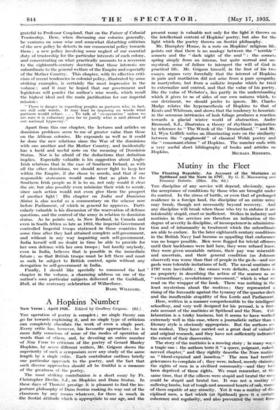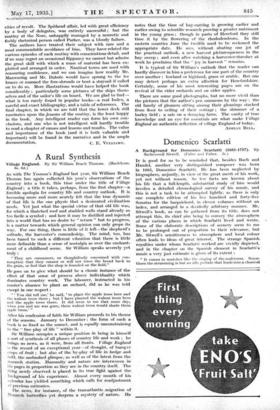Mutiny in the Fleet
Tam discipline of any service -will depend, obviously, upon the acceptance of• conditions by those who are brought under its control. In the stress of battle, or even that of prolonged -residence in a foreign •land, the discipline of an entire army may break, though not necessarily beyond recovery. And any discipline will break when those who try to enforce it are intolerably stupid, cruel or inefficient. Strikes in industry and mutinies in the services are therefore an indication of the degree of severity in discipline, of incompetence-in administra- tion and of inhumanity in treatment which the subordinate are able to endure. Irrthe later eighteenth century conditions in the =British Navy had become so appalling that endurance was no longer possible. Men were flogged for trivial offences until their backbones were laid bare, they were ref-used leave. they were given uneatable rations, their pay was miserable and uncertain, and their general condition (as Johnson observed) was worse than that of people •in the gaols--and our gaols were tolerable -imitations Of hell. The naval -mutinies of 1797 •were inevitable ; the causes were definite, and there is no propriety in describing the action of the seamen as an "extraordinary, revolutionary movement," which is what we -read on the wrapper of the book. There was nothing in the least mysterious about the motives ; they represented a rising of the forecastle against the tyranny of the-quarter-deck and the insufferable stupidity of Sea Lords and Parliament. -Here, written in a manner, comprehensible to the intelligent - schoolboy, and very Well designed for his perusal, is a first- .rate account of-the-mutinies at Spithead and the Nore. -Col- laboration is a tricky business, but it • seems- to -have worked 1-extremely well in this case, where a journalistic rather than .literary style is obviously appropriate. But the authors are !too modest. They have carried out a great deal of valuable .and original research, and they have not sufficiently indicated the extent of their discoveries.
The story of the mutinies is a moving story ; in many ways a tragic one : the authors term it " a queer, poignant, naked- -nerved chapter," and they rightly• describe the Nore mutiny 'as " blood-expiated and issueless." The men had terrible .grievances to complain of ; they were, indeed, merely claiming the rights of men in a civilized community—and they had been deprived of -those rights. We -must remember, at -the same time, that if the officers were stupid and brutal the me" _could be stupid and brutal too. It was not a mutiny of suffering lambs, but of tough and seasoned hearts of oak,-many -of them capable of any atrocity. Yet it was a mutiny of dis- ciplined men, a fact which (at Spithead) gave it a certain coherence and regularity, and also prevented the worst fero-
cities of revolt. The Spithead affair, led with great efficiency by a body of delegates, was entirely successful ; but the mutiny at the Nore, unhappily managed by a neurotic and -feebly rhetorical person called Parker, was a bloody failure.
The authors have treated their subject with care and a most commendable avoidance of bias. They have related the various episodes of each mutiny with conscientious detail, and if we may regret an occasional flippancy we cannot but admire the great skill with which a mass of material has been ex- ploited and arranged in order. Nautical terms are used with reassuring confidence, and we can imagine how readily Mr. Manwaring and Mr. Dobree would have sprung to the lee braces or manned the fore-shrouds or bent a staysail if called on to do so. More illustrations would have helped the book considerably ; particularly some pictures of the ships them- selves and of the sailor's life on board. We are glad to find— what is too rarely found in popular books—a real Index, a careful and exact bibliography, and a table of references. The final chapter, in which we are told that the lower deck still ruminates upon the )essons of the mutiny, is the least happy in the book. Any intelligent reader can form his own con- clusions, and one who is not intelligent will hardly trouble to read a chapter of causes and lessons and results. The value and importance of the book (and it is both valuable and important) will be found in the narrative and in the ample











































 Previous page
Previous page